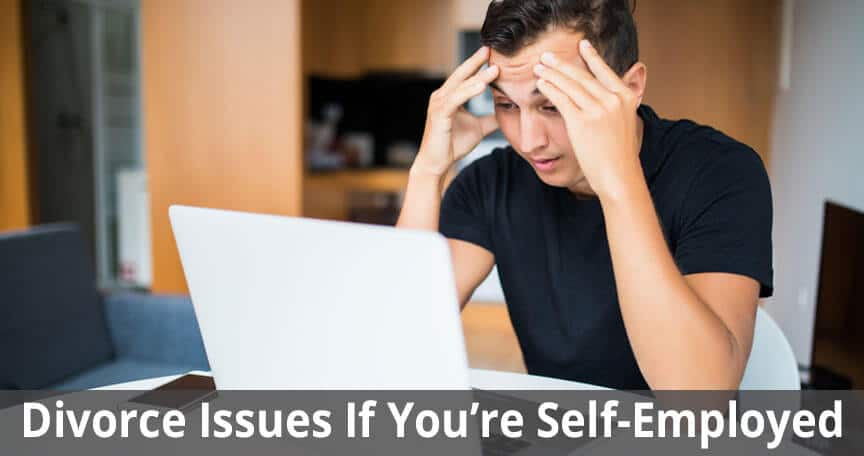Does Being Self-Employed Affect Your Long Island Divorce?

Many people are concerned about their divorce affecting their job, however, the reverse is also frequently true. Your employment may impact your divorce in significant ways, particularly if you’re self-employed. Here’s what to expect if you own a business or otherwise work for yourself and are getting a divorce.
You’ll Need to Do More to Prove Your Income
Self-employment income is more difficult to prove than traditional income in any situation, not just in a divorce. If you’re a contractor, for example, you may get a 1099 once a year instead of W2s. Or, you may be responsible for calculating miscellaneous income yourself. If you’re a business owner, you’ll need to assess your gross income, expenses, and net profits. With most types of self-employment, the pay is erratic or differs substantially from month to month. This, coupled with the lack of pay stubs, makes it challenging to calculate an accurate estimate of your income. Expect to gather six months or more of bank statements and fill out multiple forms.
You May Be Accused of Not Making Full Financial Disclosure
Because self-employment income is so variable, and you’re primarily the person in charge of tracking your own income, it would be relatively easy to alter your financial data. Whether there’s evidence to suggest it or not, you may be accused of hiding assets or falsifying financial records. For example, your ex-spouse may suggest that you’re processing payments using another account instead of your primary bank account, or otherwise altering financial data to suggest that you make less than you really do to lessen your ex-spouse’s divorce settlement or alimony payments. Brush off accusations with facts and make your financial data as transparent and trackable as possible. As long as you have the information to back up your claims, accusations of falsifying financial records won’t amount to much.
Your Ex-Spouse May Be Entitled to Some of Your Profit
If you started the business after you got married or your ex-spouse worked for the business during your marriage, they may be entitled to a portion of your company’s profit. For example, if you and your ex-spouse co-owned the business and decide to liquidate it in the divorce, they are likely to be awarded a portion of the assets equal to their stake in the company. However, if you started your business prior to getting married, your ex may not be entitled to any of its profit at all. Equitable distribution is often more challenging when businesses are involved, so it’s important to have sound guidance throughout the divorce process to ensure that you’re protecting everything that rightfully belongs to you.
You May Need to Pay Spousal Support or Alimony
If you were the primary breadwinner for the family and your spouse stayed at home, you may be required to pay spousal support or alimony every month for a period following your divorce. Almost all spousal support is temporary; even “permanent” spousal support in New York is rarely ever actually permanent. It’s designed to help your ex-spouse make ends meet until they can support themselves and live independently. This can cut deeply into your profits because alimony is calculated based on your income. The more money you make, the more you will pay in spousal support. Full financial disclosure is also important to ensure that your earnings aren’t overestimated.
You’ll Need to Hire a Long Island Divorce Lawyer
If you’re self-employed and considering a divorce, it becomes even more important to work with a skilled Long Island divorce attorney who has specific experience representing business owners and others who work for themselves. There’s a lot on the line with any divorce, but for self-employed individuals, much more is often at stake. It’s critical to your livelihood to have trustworthy, competent legal advice from the initial divorce filing to the final settlement. Our divorce and family law firm is dedicated to supporting you through this difficult chapter of your life and aggressively protecting your business assets. Call today for a consultation at 631-923-1910.
SCHEDULE YOUR FREE CONSULTATION TODAY
Call 631-923-1910 or fill in the form below

Schedule your complimentary consultation and case evaluation with our experienced attorneys today. When you call, you’ll speak to our friendly Client Services Director, who will be able to answer your general questions and set up your appointment with an attorney who specializes in your unique case.
At your meeting, your attorney will describe the many options available and determine together which is the right solution for you. By the end of this meeting we’ll all understand how we can best help you to move forward.
No Cost or Obligation
There is no cost or obligation for this initial consultation. It is simply an opportunity for us to get to know each other, answer your questions and learn if Hornberger Verbitsky, P.C. is right the right law firm for you. Give us a call at 631-923-1910 or fill in the short form below to schedule your free consultation and case evaluation.
All Fields Are Required













